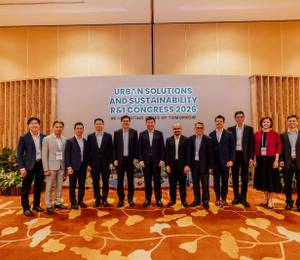On World Environment Day, Cara Quinn, Principal in the Environment and Health business in Singapore at Ramboll, talks about how companies need to do things differently to truly own their ESG strategy.
ESG is not a new term. It stands for Environmental, Social and Governance, a term which rose to prominence during the United Nation’s (UN) Who Cares Wins initiative in 2005. Prior to this, World Environment Day was minted by the United Nations Environment Programme (UNEP), the global authority for the environment with programmes focusing on climate, nature, pollution, and sustainable development, over 50 years ago in 1972. It has since been commemorated in the form of events held by governments, organisations, schools, and communities alike – with the goal of raising awareness, celebrate progress, and planning for the future.
This brings us to the significance of World Environment Day 2022 – themed ‘Only One Earth’ – which highlights the need for us to live sustainably and in harmony with nature by bringing about transformative changes towards cleaner and greener lifestyles to protect and preserve our environment – be it through mandated policies and regulations, or our deliberate individual choices.
But how do we exact transformative change? The solution is to consciously start doing things differently. Whilst this can be achieved at the individual level, organisation have a large role to play, and we are seeing rapid change in market place with corporate adoption of environmental initiatives. However to be truly transformative, companies not only need to focus on the Environmental of ESG, but also adapting the Social and Governance dimensions, to bring about a holistic, inside-out change.
Social elements include creating an inclusive and engaging workforce; ensuring human rights are protected in procurement, whilst governance refers to the framework in which the company operates such as compliance and anti-corruption processes.
Assessing and incorporating objectives relating to these Social and Governance elements allows a holistic assessment that recognises the value of the entire ESG framework. Most organisations now understand how to account for environmental dimensions - in terms of quantifiable numbers (energy, greenhouse gas emissions, resources consumption, waste generated etc) - the social and governance dimensions are often overlooked or not understood. Incorporating Social and Governance elements allows real change.
The importance of ESG
ESG factors are critical cornerstones in succeeding as a sustainable business. Combined with the right financial metrics, these provide insight into the pulse of a company’s operations, current performance, and projected trends over time. These sustainability strategies and ESG agendas are created within an organisation – and ultimately will be those who determine how your company transforms over time, be it along the lines of embracing decarbonisation, advocating biodiversity preservation, or shifting towards a circular economy. It all depends on you, your people, and the sphere of influence within the company and communities within which you interact.
Think of it this way: A good sustainability strategy will enable you to embark on this significant journey, while ESG factors will be the living and breathing metrics by which your operations will be judged – the heartbeat of this transformative frame. With the insurgence of the younger generations joining the workforce, we too observe a corresponding rise in demand to be part of something worthwhile, to partake in something one believes in, and to work for a company with a set of values that align with their own. This is similarly reflected in the expectations of stakeholders such as customers, investors, and the community around you – all of whom expect responsible behaviour to both the environment and the wider society. Individual choices, and collectively those of companies and communities, are all expected to play a part in bringing about the transformative change needed to stop, slow down, and construct the necessary resilience needed to tackle global threats such as climate change, biodiversity loss, and resource constraints.
But what do companies need to do differently to truly embed ESG agenda in their operations?
This starts with asking yourself three simple questions:
A. Are your organisation’s vision, mission, and values an enabler of the change needed to improve your ESG performance?
If not, consider what are the core values meaningful to your company, and develop your ESG practices from there.
B. Are your organisation’s compliance programmes and supporting policies and procedures due for a refocus on business integrity, ethics, and governance structures core to ESG (and financial) success?
If the answer is yes, be sure to engage your Chief Operating Officer (COO) and Chief Financial Officer (CFO) in this discussion to kickstart your journey.
C. Finally, is your organisation committed to prioritising people – not just employees, but also stakeholders which your organisation interacts with such as customers, supply chain, stakeholders, communities, etc.?
If the answer is no, it would be good to engage with your Human Resource (HR) department, or Chief Procurement Officer (CPO) to kickstart conversations. People are the agents of change.
It is one thing to deliver on your promise of a sustainability strategy. It is another to put in place robust systems which not only measure, but also continuously improve ESG performance and help manage related risks and opportunities. Annual performance reports and disclosures are a good place to start; however continual improvement, upskilling, upgrading, change, and even transformation, is not just inevitable, but has rather evolved into a necessity for more sustainable business operations.
By addressing the Social and Governance parameters, this inevitably impacts the Environmental parameters in a positive light. When it comes to tackling some of the world’s biggest climate change issues – such as reducing greenhouse gas emissions, taking climate action, transitioning to alternative sources of energy, designing out waste and optimising resource use for a cleaner, greener environment – the change starts from within. We need to first stand up, stand out, and take action by doing things differently. We have Only One Earth, after all.
About the author
Cara Quinn is a Senior Managing Consultant with Ramboll Environment and Health. With over two decades of experience, Cara advises clients in Singapore and APAC on sustainability, ESG and environmental management across a range of sectors, including high-tech, land development, construction, and project finance. A civil engineer by trade, Cara holds a Masters in environmental assessment and evaluation from the London School of Economics and has advised on various building development projects as a LEED Accredited Professional, a Green Mark Manager, and a Sustainability Consultant.











